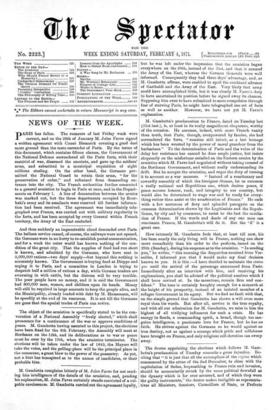M. Gambetta's proclamation to France, dated on Tuesday last (31st
inst.), is, at least in its really magnificent eloquence, worthy of the occasion. He assumes, indeed, with more French vanity than truth, that Paris, though, overpowered by famine, she had surrendered the forts, " remains still intact, as a last homage which has been wrested by the power of moral grandeur from the barbarians." To the determination of Paris and the value of the delay her resistance has caused he does ample justice, but insists eloquently on the misfortune entailed on the Eastern armies by the armistice which M. Fevre had negotiated without taking counsel of the Bordeaux Government, and without really understanding its drift. But he accepts the armistice, and urges the duty of turning it to account as a war measure. " Instead of a reactionary and cowardly assembly of which the foreigner dreams, let us summon a really national and Republican one, which desires peace, if peace secures honour, rank, and integrity to our country, but would also be determined to wage war and be ready for every- thing rather than assist at the assastination of France." He ends with a few sentences of fiery and splendid panegyric on the common determination shown by the Legitimists and the Repub- licans, by city and by commune, to resist to the last the mutila- tion of France. If the words and deeds of any one man can reanimate France, M. Gambetta's will do it. But the ' if' is a great one.






























